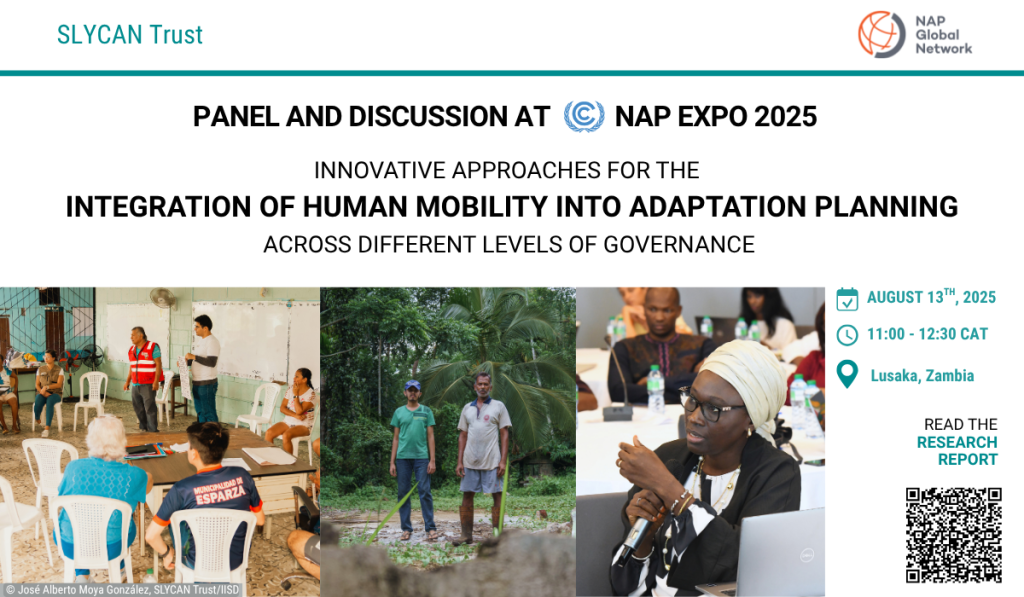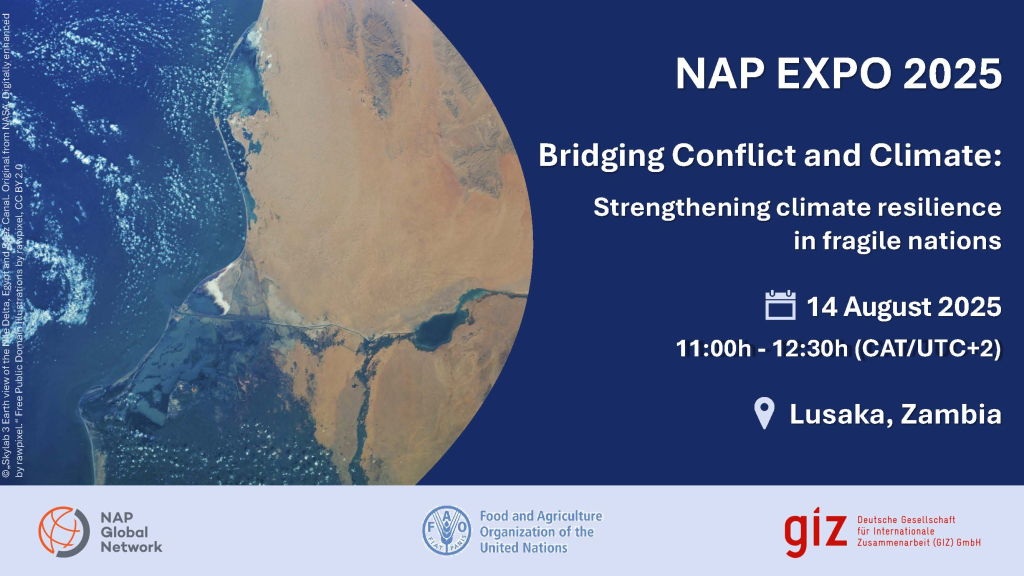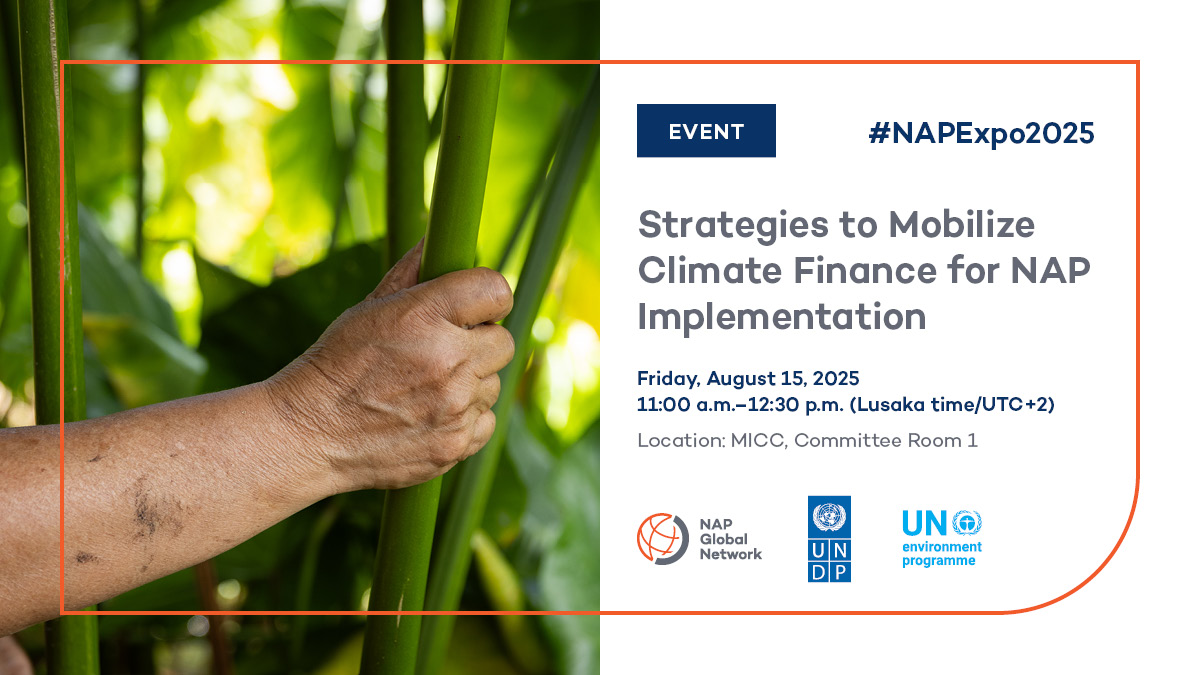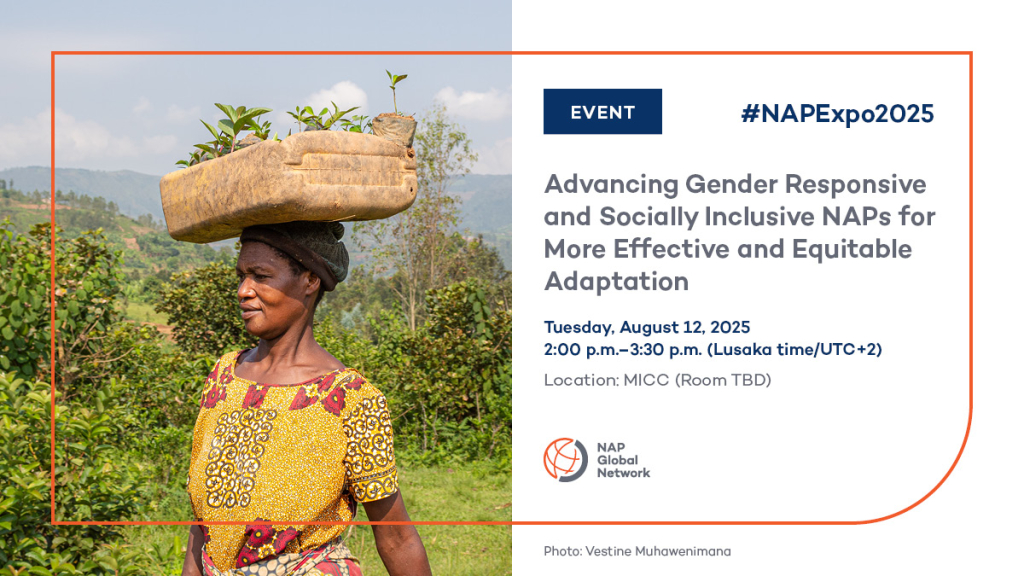Zambia hosted the 10th global flagship event dedicated to national adaptation plan (NAP) processes. From August 12 to 15, the NAP Expo 2025 took place at the Mulungushi Conference Centre (MICC) in Lusaka with the theme ‘Innovations in the NAP Process.’ This annual event is organized by the Least Developed Countries Expert Group (LEG) under the United Nations Framework Convention on Climate Change (UNFCCC) in collaboration with various bodies and organizations. It assembles a wide range of actors to foster partnerships and promote the exchange of experiences on how to raise adaptation ambition by advancing the formulation and implementation of NAPs.
Members of the NAP Global Network team co-hosted event sessions with partner countries and organizations from the adaptation community, where they exchanged insights and lessons on how to achieve effective and inclusive NAP processes. The full NAP Expo 2025 program can be accessed via this link.
At this NAP Expo, the NAP Global Network’s activities focused on
- scaling up finance to accelerate countries’ NAP implementation,
- advancing gender-responsive and socially inclusive NAP processes,
- integrating peacebuilding into NAP processes,
- strengthening the linkages between adaptation planning across different levels of governance, and
- enhancing institutional arrangements to support community-based and locally led adaptation
On the margins of this year’s NAP Expo, the NAP Global Network co-hosted an “Adaptation Investment Matchmaking Symposium” on August 11 in Lusaka, which focused on accelerating finance for NAP implementation. See below for more details of our participation at NAP Expo 2025.
Photo Gallery
Sessions
Advancing Gender-Responsive and Socially Inclusive NAPs for More Effective and Equitable Adaptation
Integrating gender-responsive and socially inclusive considerations in NAPs makes them more effective and equitable. While steady progress has been made over the years on this front, it still requires the work and attention of adaptation leaders.
This interactive session enabled participants to explore together how to consider gender equality and social inclusion in three critical areas where attention is urgently needed: women’s leadership; monitoring, evaluation, and learning; and gender-responsive implementation. Drawing on the latest evidence of progress gathered by the NAP Global Network, as well as concrete experiences shared by country representatives, participants explored the solutions that can work in their context and make their NAP more gender-responsive and inclusive.
- Date: Tuesday, August 12, 2025
- Time: 2:00 p.m.–3:30 p.m. (Lusaka time/UTC+2)
- Location: MICC (Committee Room 2)
- Host: NAP Global Network
Explore presentations and additional resources from this event here.
Integration of Human Mobility in Adaptation Planning Across Governance Levels
While NAPs increasingly include references to human mobility, there is a need to further integrate these into planning and action across different levels of governance.
This session focused on sharing experiences with integrating human mobility across countries and stakeholder groups, with the aim of collecting emerging trends, good practices, challenges, and opportunities. During the event, participants especially highlighted key findings and recommendations from Costa Rica, Senegal, and Sri Lanka.
- Date: Wednesday, August 13, 2025
- Time: 11:00 a.m.–12:30 p.m. (Lusaka time/UTC+2)
- Location: MICC (Committee Room 4)
- Hosts: SLYCAN Trust and NAP Global Network
Click here to access presentations and related resources from this event here.
Bridging Conflict and Climate: Strengthening climate resilience in fragile nations
According to the most recent Adaptation Gap Report, fragile states struggle the most in starting and pursuing a national adaptation process. Of the 10 countries that currently have no national adaptation planning instrument (policy, strategy, or plan) in place or under development, seven rank high on the Fragile States Index, suggesting that they face internal fragility, conflict, or geopolitical tensions.
Adaptation is rarely, if ever, an immediate priority. However, evidence shows that climate impacts interact with conflict factors to increase the vulnerability of people to both conflict and climate challenges. People displaced by conflicts need to establish new livelihoods in regions at higher climate risks. Farmers losing their livelihoods due to the impacts of climate change are more prone to recruitment by non-state armed groups. Competition around climate-induced scarcity of water and land can lead to new conflicts among groups or exacerbate existing tensions.
Against this backdrop, NAP processes are uniquely placed to simultaneously address both the adverse impacts of climate change and conflict drivers, with the overall aim to reduce climate vulnerabilities and support peacebuilding.
This session shared experiences of conflict-affected states in pursuing their NAP process in a conflict-sensitive way. It also showcased good examples of where countries can start if they want to integrate peacebuilding into their adaptation efforts or vice versa.
- Date: Thursday, August 14, 2025
- Time: 11:00 a.m.–12:30 p.m. (Lusaka time/UTC+2)
- Location: MICC (Committee Room 4)
- Hosts: Food and Agriculture Organization, Deutsche Gesellschaft für Internationale Zusammenarbeit, and NAP Global Network
Find presentations and supporting resources from the event here.
Scaling Up Locally Led Adaptation: The role of innovative institutional arrangements in enhancing NAP implementation
Despite community-based adaptation (CBA) and locally led adaptation (LLA) gaining recognition in countries’ adaptation plans—and their proven effectiveness—there remain barriers to their implementation at scale. This interactive session built on real-world examples of how CBA and LLA have been integrated into institutional arrangements and supported significant and systemic changes for the most vulnerable groups.
The session allowed participants to gain a better understanding of the innovative institutional arrangements needed to scale the implementation of CBA and LLA to support NAP implementation through engagement with experts, group discussions, and case studies.
- Date: Thursday, August 14, 2025
- Time: 2:00 p.m.–3:30 p.m. (Lusaka time/UTC+2)
- Location: MICC (Committee Room 4)
- Hosts: International Institute for Sustainable Development, CARE International, Food, Agriculture and Natural Resources Policy Analysis Network (FANRPAN), and NAP Global Network
View supporting resources from the event here.
Strategies to Mobilize Climate Finance for NAP Implementation
It is widely accepted that there is a significant shortfall in finance to implement adaptation priorities in NAPs. In 2024, the UN Environment Programme estimated that developing countries need USD 215 billion–USD 387 billion per year, compared to just USD 27.5 billion in public adaptation finance flows from developed to developing countries—a major gap.
Many African countries have advanced adaptation planning by submitting NAPs, identifying priority projects, securing direct access to climate funds, and undertaking other enabling actions. Still, most face significant funding shortfalls, with ministries of finance often engaged too late in the process.
Given today’s geopolitical context, public finance alone cannot meet adaptation needs. So, how can countries fill the gap? Can private finance play a role? Is there scope to expand public–private partnerships? Or must domestic public finance step in?
This session explored those questions with the aim of strengthening the link between adaptation plans and investment opportunities—mobilizing investors, diversifying funding sources, and leveraging partnerships to build a strong adaptation pipeline. African speakers shared experiences of mobilizing finance for adaptation, alongside funders offering insight on challenges and opportunities. The session also examined new trends in climate finance and highlight how investment plans can unlock resources and accelerate NAP implementation by 2030.
- Date: Friday, August 15, 2025
- Time: 11:00 a.m.–12:30 p.m. (Lusaka time/UTC+2)
- Location: MICC (Committee Room 1)
- Hosts: United Nations Development Programme, United Nations Environment Program, NAP Global Network
Find supporting resources from the event here.
Events featuring NAP Global Network representatives as panelists
The Head of Secretariat for the NAP Global Network, Orville Grey, participated as speaker in the following sessions organized by partners:
- Generating Finance for Adaptation to Meet Growing Adaptation Needs | Wednesday, August 13, 2025, 11:00 a.m. – 12:30 p.m. (Lusaka time/UTC+2), Committee Room 1.
- High-level Dialogue on NAPs | Thursday, August 14, 2025, 9:00 a.m. – 11:00 a.m. (Lusaka time/UTC+2), Main Hall, Old Wing. Watch the session recording here.
- Building systemic capacity for investment-ready NAPs: Addressing critical gaps in the climate finance ecosystem | Friday, August 15, 2025, 9:00 a.m. – 10:30 a.m. (Lusaka time/UTC+2), Committee Room 1
Discover the latest information and trends in National Adaptation Plans (NAPs).
Related Content
- VIDEO| What Is the National Adaptation Plan Process?
- PUBLICATION | Toolkit for a Gender-Responsive Process to Formulate and Implement National Adaptation Plans (NAPs)
- SYNTHESIS REPORT | Advancing Gender-Responsive National Adaptation Plan (NAP) Processes: State of play and promising examples
- GUIDANCE NOTE | Peace, Conflict, and NAP Processes
- RESEARCH REPORT | Climate-Related Human Mobility Across Different Levels of Adaptation Governance
- ONLINE COURSE | Monitoring, Evaluation, and Learning for National Adaptation Plan Processes
- PUBLICATION | Toolkit for Monitoring, Evaluation, and Learning for National Adaptation Plan Processes
- REPORT | Finance for National Adaptation Plan Processes: What can we learn from countries’ national adaptation plans?
Contact
For more information on the NAP Global Network’s activities and engagements, contact the Secretariat team at info@napglobalnetwork.org.
For media enquiries, please get in touch with our Communications Officer, Adrian Estanol, at aestanol@iisd.ca and our Communications Manager, Juliet Perry, at jperry@iisd.ca.
Join a network of adaptation decision-makers and practitioners from the Global South working on NAP processes to
- receive the NAP Global Network’s monthly newsletter with news and useful resources,
- apply for technical support and peer learning opportunities, and
- sign up here.


